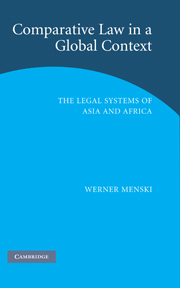Crossref Citations
This Book has been
cited by the following publications. This list is generated based on data provided by Crossref.
Sorrentino-Holden, Livia
2003.
Images du corps dans le monde hindou.
p.
435.
Haider, Mostafa
2008.
Recognising Complexity, Embracing Diversity.
South Asia Research,
Vol. 28,
Issue. 1,
p.
49.
Grillo, Ralph
and
Woodman, Gordon R.
2008.
Book Review.
The Journal of Legal Pluralism and Unofficial Law,
Vol. 40,
Issue. 58,
p.
115.
Eberhard, Christoph
2008.
Law, land use and the environment: Afro-Indian dialogues.
p.
1.
Amoah, Jewel
and
Bennett, Tom
2008.
The Freedoms of Religion and Culture under the South African Constitution: Do Traditional African Religions Enjoy Equal Treatment?.
Journal of Law and Religion,
Vol. 24,
Issue. 1,
p.
1.
Menski, Werner
2008.
The Uniform Civil Code Debate in Indian Law: New Developments and Changing Agenda.
German Law Journal,
Vol. 9,
Issue. 3,
p.
211.
Eberhard, Christoph
2008.
Law, land use and the environment: Afro-Indian dialogues.
p.
29.
Mapaure, Clever
2009.
Legal Hybridity: A Comparative Analysis of the Role of Custom and Intricacies of Legal Pluralism in Relation to Customary Marriages in Britain and African Jurisdictions.
SSRN Electronic Journal,
Ghosh, Partha S.
2009.
Politics of Personal Law in India.
South Asia Research,
Vol. 29,
Issue. 1,
p.
1.
Michaels, Ralf
2009.
Global Legal Pluralism.
Annual Review of Law and Social Science,
Vol. 5,
Issue. 1,
p.
243.
Shah, Prakash
2009.
Transnational Hindu law adoptions: recognition and treatment in Britain.
International Journal of Law in Context,
Vol. 5,
Issue. 2,
p.
107.
Venning, Philippa
2010.
Marrying Contested Approaches: Empowerment and the Imposition of International Principles: Domestic Violence Case Resolution in Indonesia.
Journal of Development Studies,
Vol. 46,
Issue. 3,
p.
397.
Menski, Werner
2010.
Sanskrit Law: Excavating Vedic Legal Pluralism.
SSRN Electronic Journal,
Mukherjee, Soumen
2010.
Two Accounts of the Colonised ‘Other’ in South Asia.
South Asia Research,
Vol. 30,
Issue. 2,
p.
165.
Menski, Werner
2010.
Slumdog Law, Colonial Tummy Aches and the Redefinition of Family Law in India.
South Asia Research,
Vol. 30,
Issue. 1,
p.
67.
Ercanbrack, Jonathan
2011.
The Regulation of Islamic Finance in the United Kingdom.
Ecclesiastical Law Journal,
Vol. 13,
Issue. 1,
p.
69.
Dickerson, Claire Moore
2011.
Informal-Sector Entrepreneurs, Development and Formal Law: A Functional Understanding of Business Law.
American Journal of Comparative Law,
Vol. 59,
Issue. 1,
p.
179.
Shah, Prakash
2011.
Equality, Inequalities and Diversity.
p.
77.
Menski, Werner
2011.
Book review: Ubiquitous Law: Legal Theory and the Space for Legal Pluralism.
Social & Legal Studies,
Vol. 20,
Issue. 4,
p.
567.
Hinz, Manfred O.
2011.
The Future of African Customary Law.
p.
153.



